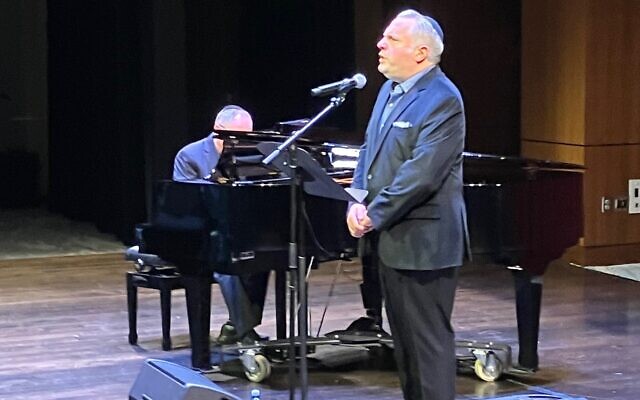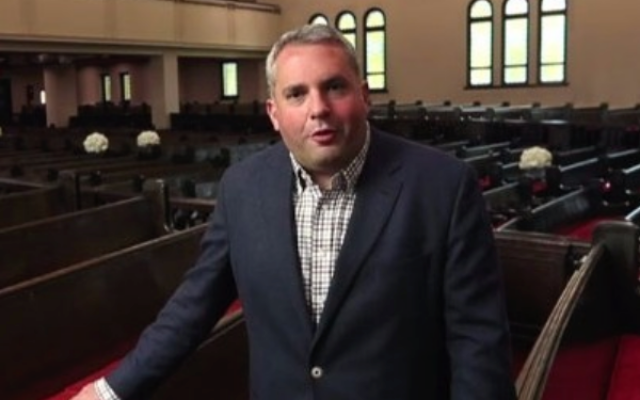Neranenah Recalls Cantorial Tradition in Concert
Montreal Cantor Gideon Zelermyer performed at Sandy Springs Performing Arts Center.

For its program on the fourth night of Chanukah, Neranenah, the Atlanta Jewish musical festival, brought Cantor Gideon Zelermyer from Montreal for its holiday concert. Several of the musical numbers in the evening reflected the traditional repertoire of chazzanut, the musical culture of the golden age of cantorial music in the late 19th and early 20th centuries.
Zelermyer is the cantor of Montreal’s famed Congregation Shaare Hashomayim, the oldest in Canada, which was founded in 1846. It is one of the few remaining synagogues in the world which carries on the traditions of the great choral synagogues that existed in pre-Holocaust Europe. In Montreal, on each Shabbat and on each Jewish festival and High Holy Days, Cantor Zelermyer dresses in a clerical robe and wears the traditional cantorial hat with a full choir and leads the worshippers in prayer.
But it was not to pray that Cantor Zelermyer came to the intimate Studio Theater of the Sandy Springs Performing Arts Center. Expertly accompanied by Stephen Glass from his Montreal congregation, Zelermyer emphasized music for what Neranenah called “An Evening of Light,” that wove together numbers from pop and Broadway and music in English and Hebrew, that often had the knowledgeable members of the audience singing along to Zelermyer’s beautiful, classically trained tenor voice.
Zelermyer paid particular attention to his congregation’s most famous member, the poet and song writer, Leonard Cohen. His work with Cohen on the singer’s final album, “You Want It Darker,” won for him and his synagogue choir a Grammy Award in 2017. Sadly, Cohen, who was seriously ill during the recording of the CD, passed away shortly before the presentation. Zelermyer participated in the funeral in Montreal and in Cohen’s burial, alongside the gravesite of his grandfather and great-grandfather who were past synagogue presidents.
Shortly before his passing, Cohen told the French language arts review, Le Dernier Empereur, that the synagogue exerted a strong influence on him as a youngster. He had his Bar Mitzvah there and the memory of the music stayed with him to the end.
“Even as a boy I loved the singing,” Cohen said. “It is what made compulsory synagogue attendance enjoyable. I’ve wanted to work with the cantor and the choir for a long time. The touring years interrupted this intention.”

As part of his evening in Sandy Springs, Zelermyer sang what he considered to be Cohen’s most Jewish song, “If it Be Your Will,” which paraphrases the final confessional prayer of the viddui, as well as it is the response by the congregation to the priestly blessing of the Cohanim during the High Holidays.
Zelermyer noted that his relationship during Cohen’s final months had started with a High Holidays greeting he sent to the singer in the last year of his life.
“He wrote back to me the most remarkable email that I’ve ever received,” he said. “’May your voice reach that place with a capital P and bring down the blessings.’
My reaction,” Zelermyer recalled, “was I’ve never heard a more succinct description of what it is that I do as a cantor as I stand in front of the congregation and become the emissary for the prayers and to channel them upward. And he understood that, and that put into motion the request to do the backing vocals for the release of “You Want It Darker.”
The emotional highpoint of the evening, though, seemed not to come from Cohen’s music, but rather, from the words and music of Naomi Shemer, the Israeli songwriter who has been described as the “first lady of Israeli music.”
Her composition of “Yerushalayim Shel Zaav, Jerusalem of Gold,” became a kind of anthem for Israel after the success of the 1967 Six-Day War and the recapture of Jerusalem after 2,000 years of exile.
Likewise, her adaptation of McCartney and Lennon’s composition of “Let It Be” became the song most associated with the darker times that followed the 1973 combat during the Yom Kippur War against Egypt and Syria.
As Rabbi Jeffrey Salkin wrote in his blog for the Religious News Service, Shemer turned the phrase, let it be, let it be in its Hebrew translation — lu yehi, lu yehi — into a prayer that says, please, please G-d. Zelermyer dedicated his performance of Shermer’s lyrics to the memory of Rose Lubin, the lone soldier from Atlanta, who was murdered while serving in Jerusalem. In that context, the lyrics were heart rendering.
There is yet a whitle sail on the horizon
Set against the dark and heavy clouds,
All that we ask for, let it be
And if in the windows by evening
The festive candles shall flicker
All that we ask for, let it be.



comments